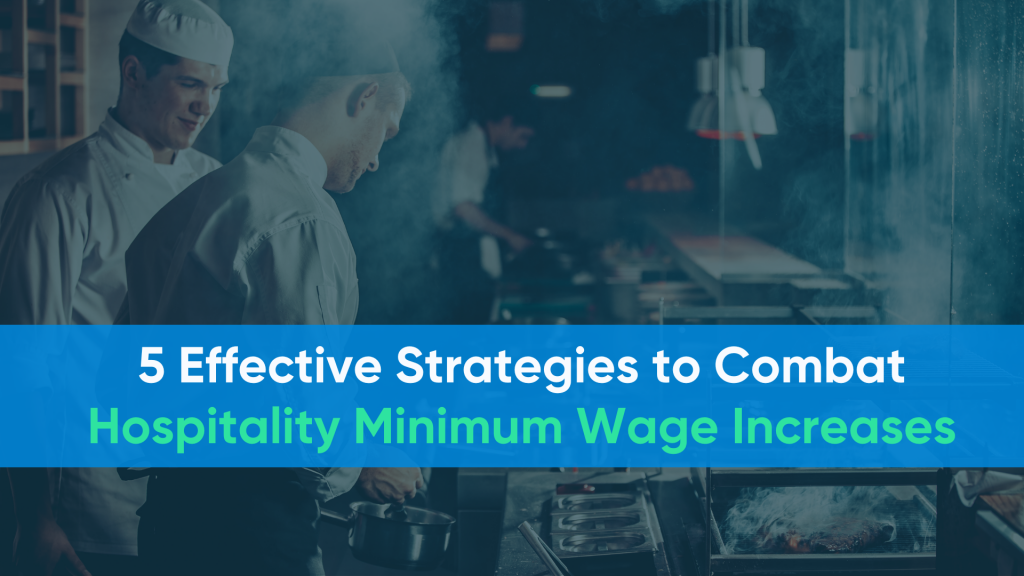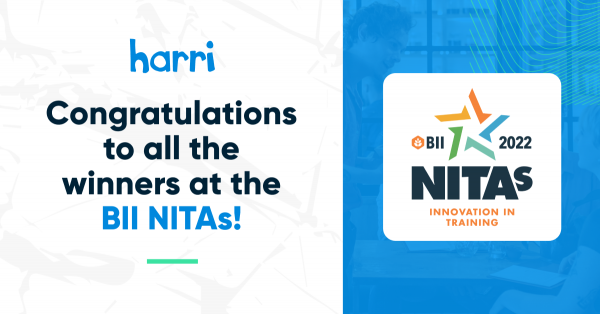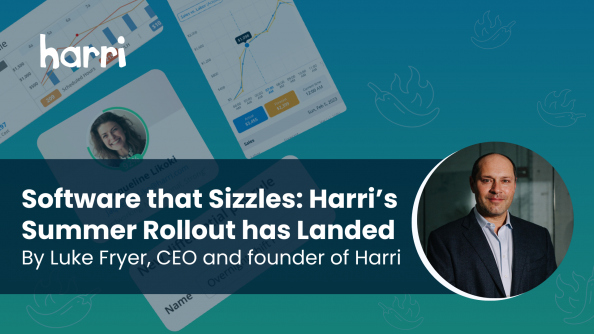5 Effective Strategies to Combat Hospitality Minimum Wage Increases

- By Harri Insider Team | February 29, 2024
Navigating minimum wage increases is a critical challenge for the hospitality industry, particularly in the wake of significant policy changes like those unfolding in California, where quick service workers are set to see their minimum wage rise to $20 an hour in April of this year. This adjustment not only sets a precedent but also directly impacts operators running restaurants nationwide with locations in the Golden State.
In response, many hospitality companies are proactively seeking strategies to mitigate the impact of these wage hikes. Some are reevaluating their operational models, as evidenced by a pizza franchise’s decision to eliminate the delivery driver role in favor of third-party delivery services. Others are contemplating adjustments to their pricing strategies, including the potential adoption of dynamic pricing—a move that, while potentially effective, could stir consumer concerns.
These developments underscore the urgency for strategic workforce management that balances profitability with employee satisfaction and operational efficiency. The adoption of technology and data-driven insights empowers hospitality leaders to adapt and flourish in an environment of rising labor costs. Through innovative workforce management, operators can fine-tune their operations and effectively respond to wage adjustments without compromising on service quality or operational goals.
Strategy #1: Leveraging AI for Accurate Demand Forecasting
Demand forecasting involves predicting future customer demand based on historical data, market trends, and other relevant factors. Traditionally, this process has been time-consuming and prone to errors. Accurate demand forecasting is a vital strategy for hospitality operators to efficiently manage their workforce, control labor costs, and make informed business decisions in response to minimum wage increases.
The deployment of AI in forecasting demand represents a leap forward in how hospitality operators can strategically manage their workforce amidst challenges like minimum wage increases. Through this advanced approach, the benefits extend beyond just understanding future needs: they shape a more agile, efficient, and responsive operational strategy.

Strategy #2: Optimize Labor Deployment
The cost of labor is a significant component of overhead.
Through a combination of analyzing past trends and future demand, operators can implement intelligent scheduling based on accurate labor forecasting to save time and reduce errors while ensuring compliance with labor regulations. This translates to engaged, empowered employees who are more likely to be productive and provide excellent customer service.
Harri’s Impact on Labor Optimization and Industry Recognition
Harri’s innovative approach to labor optimization has been recognized for its effectiveness in delivering labor cost savings and reducing employee turnover—a perennial challenge in the hospitality industry.
“Harri is transforming the front-line employee experience and equipping organizations with the necessary tools for more effective management of a diverse workforce. Their track record includes delivering significant labor cost savings within their customer base, addressing the persistent issue of high employee turnover. Harri’s strategic initiatives for engaging with franchises, mobile onboarding, and feedback mechanisms, which consider implicit factors such as frequent shift swaps and consistent tardiness, underscore their potential impact to the industry.”
Jessica Cheung, Senior Advisor, Mercer-Leapgen
In essence, Harri leverages its technological and data-driven platform to offer a sophisticated solution to labor deployment challenges, proving instrumental for businesses aiming to navigate the complexities of labor cost management in the wake of minimum wage hikes.
Strategy #3: Enforce Schedule Adherence and Prevent Wage Theft
Enforcing schedule adherence and preventing wage theft serve as critical strategies for the hospitality industry to navigate the challenges posed by minimum wage increases. By ensuring that schedules are strictly followed, hospitality businesses can optimize labor costs, avoiding the financial strain of unplanned overtime or understaffing. Simultaneously, by safeguarding against wage theft, companies not only protect their employees’ rights but also maintain operational integrity and compliance with labor laws. Together, these practices allow you to manage labor expenses more effectively in the face of rising minimum wages, ensuring both financial stability and ethical labor practices.
Strategy #4: Minimize Labor Exceptions
In the service industry, labor exceptions such as overtime, missed breaks, and schedule deviations can lead to significant additional expenses for operators. These exceptions not only impact labor costs but also compliance with labor laws and regulations. By minimizing labor exceptions, operators are able to reduce premiums and penalties for better cost control. Real-time monitoring, automated schedule enforcement, and compliance with labor laws minimize premiums and penalties, enhancing cost control and operational efficiency.

Strategy #5: Automate Manager Tasks
Restaurant managers often find themselves overwhelmed with administrative tasks. Automating manager tasks in hospitality is crucial amidst minimum wage increases to streamline operations, reduce labor costs, and maintain profitability. By leveraging automation, operators can optimize scheduling, payroll processing, and communication, allowing managers to focus on strategic initiatives rather than administrative burdens. This efficiency helps mitigate the financial strain of higher labor expenses, ensuring the business remains competitive and sustainable.
With the help of Harri, managers can automate various tasks, such as scheduling, time tracking, and initiating payroll.
“The managers have responded extremely well. The system is easy to use, it’s slick, it’s pretty self-explanatory for them, and anything that they don’t need to do extra with the new system, they can spend time with their customers, with our team, which is ultimately a good thing.”
Sarah Dickinson, Recruitment Manager, Fuller’s
How Harri Supports Hospitality Operators
Harri, a sophisticated workforce management platform, integrates seamlessly into the strategies outlined above, offering technology and data-driven solutions to labor deployment challenges.
Key Harri benefits include:
- AI-Powered Forecasting: Harri’s advanced AI forecasting engine delivers accurate demand predictions, enabling data-driven staffing decisions.
- Labor Optimization: Through granular deployment and intelligent scheduling, Harri ensures labor is aligned with operational needs, maximizing efficiency.
- Schedule Enforcement: Harri’s platform facilitates schedule adherence and wage theft prevention with real-time monitoring and automated enforcement tools.
- Managerial Efficiency: By automating tasks such as scheduling and payroll processing, Harri empowers managers to focus on customer and team engagement.
- Employee Retention: Harri enhances job satisfaction and work-life balance through fair and transparent scheduling, boosting retention rates.
Harri’s commitment to transforming the frontline employee experience has delivered significant labor cost savings and reduced turnover, earning recognition within the hospitality industry.
Improve Employee Retention and Combat Wage Increases
Embracing these five strategies for workforce management amidst minimum wage increases positions hospitality operators to manage labor costs effectively while promoting employee retention. By investing in their workforce’s experience and satisfaction, operators not only mitigate the financial challenges posed by wage hikes but also unlock the potential for greater innovation, employee and customer loyalty, and market competitiveness.





















